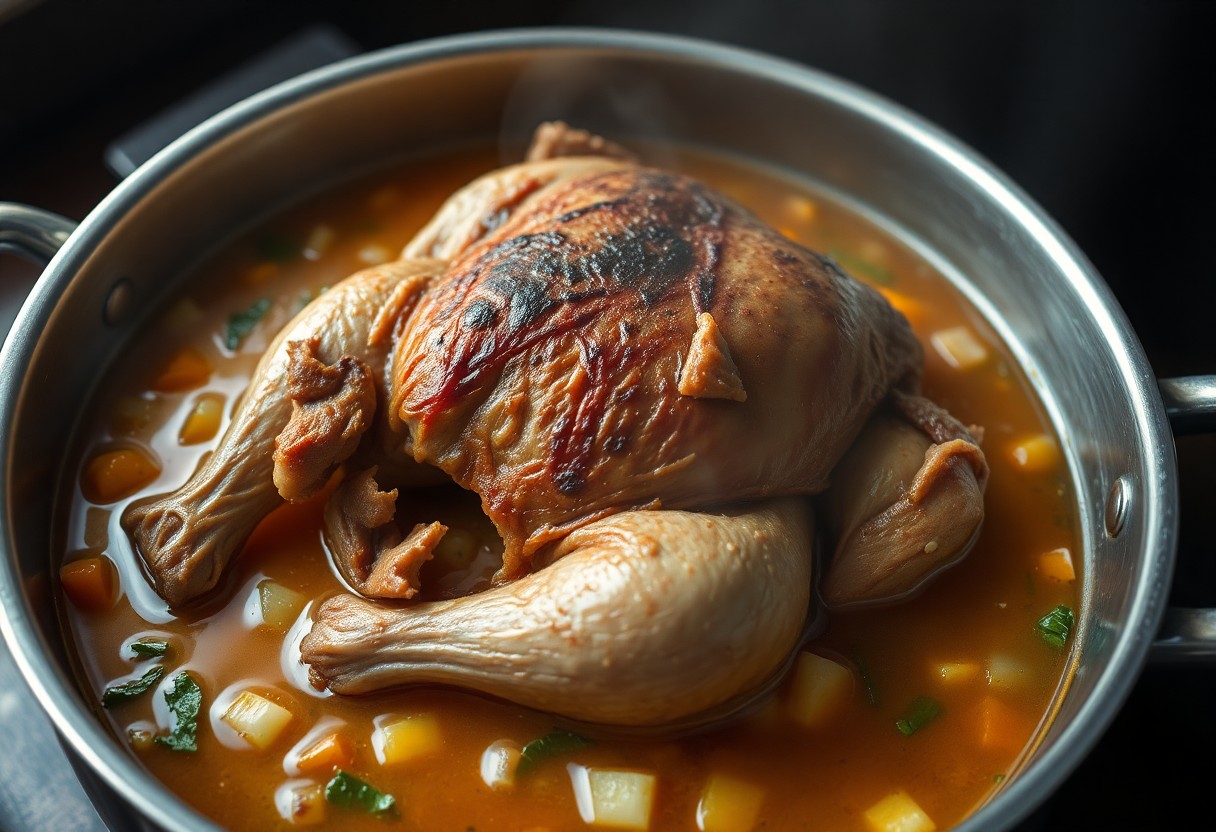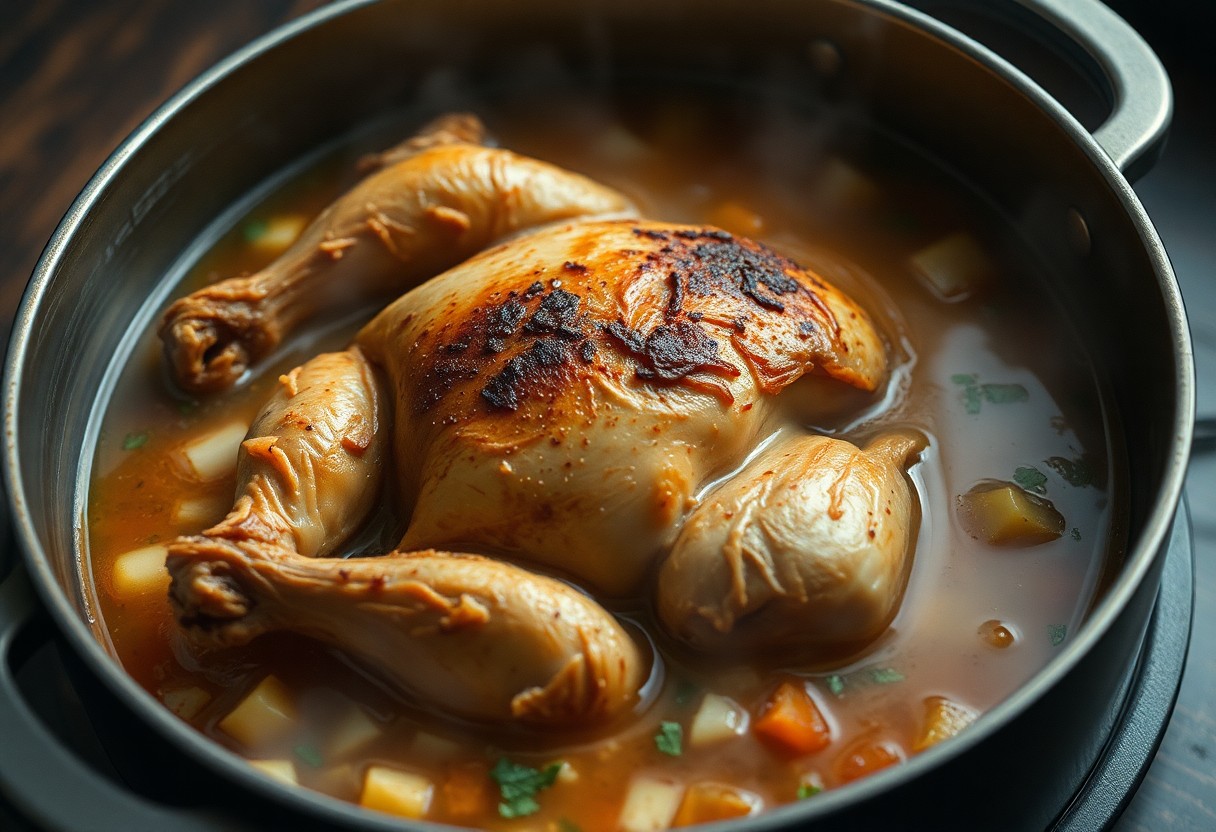There’s a fine line between a perfectly simmered chicken soup and a dish that leaves much to be desired. When you overcook the chicken, you risk ending up with a rubbery texture and a loss of flavor that can detract from your soup. Not only does the taste suffer, but the chicken can also become dry and unappetizing, compromising the overall experience of your beloved comfort food. In this post, we’ll explore the pitfalls of overcooking chicken and how to avoid them, ensuring your soup is always a delight.

Key Takeaways:
- Overcooked chicken becomes dry and tough, losing its juiciness and tenderness that are imperative for a flavorful dish.
- The nutritional value of chicken can diminish when overcooked, potentially leading to a loss of vitamins and minerals that are important for health.
- To prevent overcooking, monitor cooking times closely and use a meat thermometer to ensure chicken reaches the safe internal temperature without exceeding it.
Understanding Chicken Soup
The comforting warmth and rich flavors of chicken soup stem from its fundamental ingredients. The key to a perfect chicken soup lies in balancing flavors and textures, where each component plays a significant role in creating a heartwarming dish. From the base of broth to the addition of vegetables and seasonings, understanding the dynamics of each ingredient is necessary for achieving a delightful bowl of chicken goodness.
The Role of Chicken in Soup
Against popular belief, the chicken isn’t merely a flavor enhancer; it serves as the soul of the soup. It’s the chicken that brings depth and richness to your broth, transforming simple ingredients into a nourishing and satisfying meal. Choosing high-quality chicken and cooking it properly allows you to maximize flavor and maintain the necessary tenderness it brings to the dish.
The Importance of Cooking Time
Behind every successful chicken soup recipe lies the cooking time, which directly affects both flavor and texture. If you cook your chicken for too long, it can result in dry, stringy meat that doesn’t blend well with the soup. Additionally, allowing the soup to simmer without overcooking ensures that the flavors meld perfectly, providing a balanced and enjoyable experience in every spoonful.
Importance of timing cannot be overstated in the art of chicken soup. Undercooking results in unsafe meat that could harbor harmful bacteria. Conversely, overcooking can lead to dried-out chicken, ruining the sought-after tender consistency you desire in your meal. Finding that sweet spot where your chicken is cooked perfectly enhances the soup’s flavor, making each bite irresistible. Always keep a close eye on the cooking time to maintain the delightful texture and moisture in your soup.
Common Mistakes in Chicken Soup Preparation
Some common pitfalls can lead to less-than-perfect chicken soup. A major issue is not paying attention to cooking times and methods, which can drastically affect both the flavor and texture of your soup. Overcooked chicken, improper seasoning, or the use of low-quality ingredients can all contribute to a disappointing final product. Being mindful of these mistakes will help you create a delicious, comforting bowl of chicken soup.
Overcooking Chicken
Around the two-hour mark, chicken can easily become dry and unappetizing if left to simmer too long. It is crucial to keep an eye on the cooking time to ensure the chicken remains tender and juicy. Overcooking can result in shredded meat that lacks flavor, leaving your soup lacking the richness you desire.
Ignoring Cooking Methods
After you start preparing your chicken soup, you might find yourself tempted to experiment with various cooking methods. However, this can lead to unfavorable outcomes. If you neglect the appropriate technique, you risk compromising the overall taste and texture of your dish. Different cooking methods such as braising or poaching can enhance the flavor of your chicken, but rushing through steps or choosing the wrong method can lead to rubbery or dry meat. Ultimately, adhering to the right cooking method will help you achieve a well-balanced, delicious chicken soup.
Consequently, focusing on proper cooking methods not only enhances the taste of your soup but also ensures that your chicken is cooked to perfection. Utilizing techniques like slow simmering allows the flavors to meld beautifully while keeping your chicken moist. Skipping important steps or cooking too quickly can lead to unpleasant textures and a lack of flavor depth, ultimately detracting from your culinary efforts. By respecting the craft of cooking, you set yourself up for success in creating a sumptuous chicken soup that delights everyone at the table.

Effects of Overcooking Chicken
Many home cooks overlook the importance of proper cooking times, leading to overcooked chicken. This mistake can profoundly affect the quality of your soup. Not only does it alter the chicken’s texture and flavor, but it can also diminish the nutritional value you intended to include in your meal. Understanding these effects can help you avoid common pitfalls and ensure a more delicious and healthful chicken soup.
Texture and Flavor Changes
Before overcooking, chicken is tender and juicy, lending a delightful richness to your soup. However, overcooking transforms the meat into a dry, rubbery texture that can detract from the overall enjoyment of your dish. The once savory flavors turn bland, making it difficult for you to savor the comforting essence of your chicken soup.
Nutritional Losses
Losses in nutritional value occur when you overcook your chicken. The heat breaks down important nutrients, particularly proteins and vitamins imperative for health. Additionally, the longer the chicken cooks, the more moisture it loses, which can also mean losing vital nutrients that are often released into the cooking liquid.
Overcooking not only depletes your chicken soup of flavor and texture, but it can also lead to significant nutritional losses. Proteins, which are vital for muscle repair and overall health, can be denatured and rendered less effective. Vitamins such as B6 and B12, important for energy production and brain health, also degrade with prolonged exposure to heat. In fact, some imperative nutrients can diminish by as much as 50% or more if the chicken is cooked too long. Ensuring you cook your chicken just right is imperative for maximizing both flavor and health benefits!
Avoiding Overcooking
All you need to do to avoid overcooking your chicken is to pay attention to timing and temperature. Proper monitoring will ensure the chicken stays moist and delicious. Utilizing a meat thermometer can help you achieve a perfectly cooked piece of chicken without the risk of dryness. Aim for an internal temperature of 165°F for safety and ideal texture.
Recommended Cooking Times
Among various cooking methods, the recommended times can vary significantly. For instance, when baking chicken at 375°F, boneless breasts typically take about 20-30 minutes, while bone-in pieces may require 35-45 minutes. Always adjust based on your equipment and chicken thickness for precise results.
Cooking Techniques to Preserve Quality
Among techniques to preserve quality, methods such as poaching and grilling are effective in preventing overcooking. You can use these techniques to maintain moisture and flavor in your chicken, enhancing your overall dish.
Also, techniques like brining before cooking can significantly improve your chicken’s moisture levels. When you brine, you enhance the flavor and juiciness by allowing the chicken to absorb some saltwater before cooking. Additionally, using the sous-vide method, where the chicken is cooked in a temperature-controlled water bath, ensures it cooks evenly without surpassing safe temperature limits, thus preventing any dryness. The key is to stay vigilant with both your timing and temperature for a succulent outcome.
Tips for Perfect Chicken Soup
For a delectable chicken soup that excites your taste buds, follow these tips:
- Use high-quality chicken for better flavor.
- Experiment with different broths to enhance the taste.
- Incorporate fresh vegetables for an added crunch.
- Season gradually, tasting as you go for balanced flavors.
After following these simple tips, your chicken soup will be nothing short of perfect!
Ingredient Selection
About selecting the right ingredients is key to making a delicious chicken soup. Choose fresh, organic chicken and vegetables whenever possible, as these will significantly enhance the overall flavor of your dish. Opt for a variety of herbs and spices to bring depth to your soup, and ensure a well-rounded meal.
Balancing Flavors and Textures
About balancing flavors and textures is vital to achieving a harmonious chicken soup. You want to combine savory, sweet, and a touch of acidity to create a satisfying taste experience that is also pleasing to the palate.
Hence, achieving the perfect balance means incorporating savory elements like onions and garlic, a hint of sweetness from carrots, and a splash of acid from lemon or vinegar. Additionally, a mix of textures from tender chicken, crisp vegetables, and soft noodles can elevate your soup to new heights. Be cautious not to overpower any single flavor, as the goal is a delightful symphony that invites you back for seconds!
FAQ: Common Questions about Chicken Soup
To get the most out of your chicken soup, there are a few common questions you might have. You may wonder about the best way to store your soup or how to achieve the perfect seasoning. It’s important to always cook chicken to a safe internal temperature of 165°F to prevent any foodborne illnesses. Additionally, overcooked chicken can become dry, leading to a less enjoyable soup. To enhance flavor, consider adding herbs and spices gradually, tasting as you go. These tips can turn your soup into a comforting masterpiece!
Final Words
Now that you understand the impact of overcooking chicken in your chicken soup, you can avoid common pitfalls and achieve a more satisfying dish. Overcooked chicken can result in a dry texture and unappealing flavor, ultimately diminishing the quality of your soup. By monitoring cooking times and utilizing proper techniques, you can ensure that your chicken remains tender and juicy, enhancing the overall experience of your meal. Embrace these insights to transform your soup-making skills and impress your family and friends with flavorful creations.
